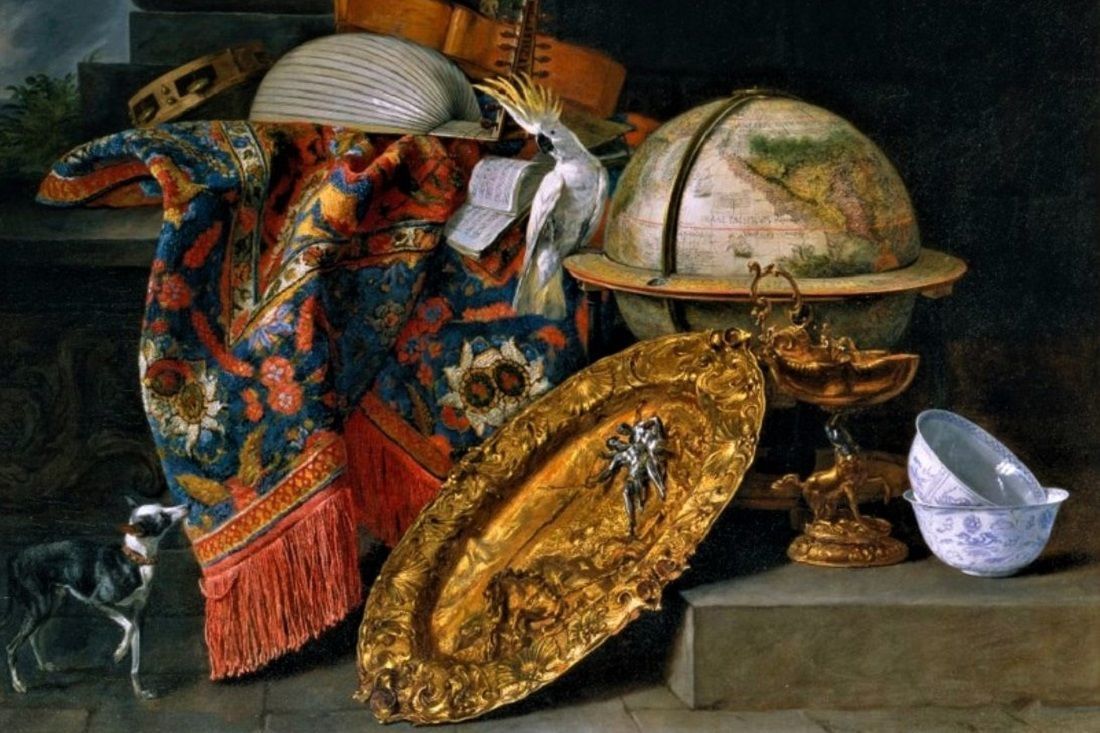When I am in a gloomy mood, which happens from time to time, I wonder whether it would not have made more sense for me to spare the time I spent writing a book on European cultural identity and, later, doing research on related issues. I could have devoted this time to other intellectual pursuits. Among the first objects of a possible study that spring to my mind are languages of the ancient Middle East such as Egyptian or Akkadian. The beauty of the cultures that expressed themselves in those languages is that there is no doubt about their being dead as doornails. Whether European culture is still alive is a moot question. It sometimes gives the impression that it is some sort of a zombie, a corpse that keeps walking. My fellow countryman Jacques Delors, then president of the European Commission, is commonly believed to have, in 1992, coined the formula, widely echoed afterward, that we should give back to Europe a soul. Which implies that it has lost it, that is, that it is at present literally inanimate. Many people translate this plea into the vocabulary of “values” which is now rampant whenever politicians or, for that matter, opinion makers of all ilks try to legitimate their doings.
The Value of Values
This prompts me to give a bit of thought to the very idea of a value and of what a value is all about. I certainly won’t plead against European values. Heaven forbid that I should even think of doing that. But I would advocate some more caution in our preaching on their behalf, more precisely on our calling them by the name of values.
Describing what European values are would not give us much mileage, and praising them would amount to bringing coal to Newcastle. Things like the rule of law; fair opportunities for everybody, male or female; mass education; cheap copies of masterpieces of painting or music; and freedom, and in particular freedom of scientific research, are commonly agreed upon, at least in European countries. Whether they are actually enforced is another kettle of fish. What is important is the kind of behavior that the care for such values induces, or should induce, in the European mind. Concrete respect for the freedom of other people and law-abiding behavior are more important than principles.
On the other hand, we should ask why all those good things, those things whose goodness can hardly be gainsaid, receive the name of “values,” a word that might be not that harmless, not as harmless, anyway, as is commonly assumed. Let us perform what filmmakers call a “dollying out” and move the camera backward. Let us ask how the kind of behavior that answers the call of values was understood in the past. Not just any past state of civilization, but the past that gave birth to European culture.
The first surprise that awaits us is that we don’t have to go that far backward to watch the disappearance of the concept of “value.” For it is not very ancient. To be sure, ancient civilizations were aware of the market price of wares. And the Stoics spoke of the axia of goods, what literally tips the scales (agein) in favor of a good. In modern times, the idea was taken over, under the name of “price,” by people like Montaigne and Pascal. It had a career in political economy. In both contexts, it meant the worth of somebody (his or her courage, in the first place) or of something. But the idea of “the values” became common parlance only after it had been powerfully orchestrated by Nietzsche in the late nineteenth century, and one generation later by the German phenomenological philosopher Max Scheler, although he hardly pulled his punches against his older fellow countryman.
The Virtue of Virtues
It is a matter of common knowledge that the main sources of European higher culture are to be found in classical antiquity and in the Bible. To use a pair of rather hackneyed catchwords, they arose in “Athens” as well as in “Jerusalem.” Now, those two sources agreed for the most part on the content of what is right and what is wrong. But they interpreted what is good or evil in different ways. Let me insist on this point: there are no such things as morals with an epithet. There are no “pagan” or “Jewish,” “Islamic” or “Buddhist” morals, nor for that matter a “humanist” morals, and for heaven’s sake no “Christian” morals. There undoubtedly are, on the other hand, different ways to understand what moral behavior is all about: doing good and avoiding evil may be a way for me to make lighter the karma of my deeds and climb a rung on the ladder of reincarnations; it may be a way to obey God’s commandments, thereby deserving paradise; it may be a way to stick to the bushido of the samurai, to the code of honor of the gentleman, or of the “pukka sahib who plays the game and doesn’t do things that are not done”; it may be a way for me to do my act of kindness; and so on. But as for what is concretely to be done, there are not that many ways to help an old lady across a street . . .
As for the most commonly accepted outlooks that molded our Western world, let us choose as spokesmen for the “Athenian” one the philosophers, Greek or Roman. All call what prompts us to do good “virtues.” Now, the Greek word for “virtue,” aretē, can designate the excellence of any kind of being, not only human beings. For instance, it made sense for the Greeks to speak of the “virtue” of a horse, that is, its swiftness in running. Plato’s Socrates begins by asking what the virtue of a horse is and then shifts to the trickier case of human virtues. Our European languages kept this meaning till a relatively recent time, when they spoke of the curative virtue of a plant or of a gem. In the seventeenth century, this was already beginning to become obsolete, wherefore Molière poked fun of the alleged virtus dormitiva of opium.
Now, running is a natural property of the horse; its ability to run faster than other ones is the peak of this natural endowment. Human care can help such beings to attain their perfection: a colt must be properly broken and groomed for it to become a good charger. Virtues are grounded in the nature of things. For us human beings, “doing good” means that we bring to fulfillment what is human in us, what constitutes the deepest core of our humanity. We do that by bringing out what most decidedly expresses what kind of beings we are, that is, rational beings, for rationality is our nature..
As for the Hebrew Bible, it doesn’t possess a word for nature, although the idea can undergird many narratives. The actions that it praises are very much the same as what the Greeks deemed praiseworthy. But it calls them by another name, that is, “commandments.” In the Bible, rulings that make possible justice and charity are issued by a transcendent Being whom biblical writers call by the name of God. This God reveals himself in the course of history and as the one who shapes history (Isa. 44:24–28). This God issued orders as clauses of a covenant with mankind at large (Gen. 9:9), and later on with Israel as God’s chosen people (Exod. 19:5). “Doing good and avoiding evil” means that one abides by God’s commandments. In present-day Jewish parlance, any good deed is still commonly called a mitzvah, that is, literally a “commandment.” Human perfection is lawfulness as listening to God’s voice.
Values as a Go-Between
We modern people prefer to speak of values. Now, this can be understood as a means to steer a middle course between the ancient and the biblical outlooks. I would rather say that this is a way of playing the one against the other. Modern thought as a whole often tries to get rid of both worldviews and to drive a wedge of its own between them by using the one as a weapon against the other, criticizing paganism with moral tools biblical in origin and the Bible with ancient, pagan intellectual implements. The question that remains is whether this synthesis is stable, hence, long-lived, rather than the fly of one day.
In particular, the utterly modern notion of “values” borrows some elements from both premodern sources of our culture. From the biblical view, they get some dimension of transcendence. Values are above us, they are the target of our striving, what we are driving at, perhaps as a goal that can’t be reached, but are the object of an indefinite yearning or, to speak like the German philosopher Fichte, a “striving” (Streben). From the ancient, classical—“pagan” if we want—outlook, values borrow their immanent dimension. They are not divine in origin, but human.
In both cases, however, the modern outlook turns against its sources. Such a turn affects the ground of moral obligation. Over against the Bible, it rejects the grounding of the good on God’s will and wisdom. And over against classical Greek and Roman philosophy, it rejects its grounding on any natural properties of beings. The English philosopher G. E. Moore has pushed this dismissal of any grounding to its logical consequences in his critique of what he calls the “naturalistic fallacy,” a mistake in which the divine unexpectedly appears as being as “natural” as, say, the interests.
The only available ground for action must be our freedom. We are supposed to be free, autonomous beings that need not be driven to action by any external principle, including this paradoxical inside outsider which we call our “nature.” Modern man is supposed neither to hearken to any divine being over above him, nor to have any nature, but to decide freely what he/she will do, and even what he/she will be.
What Gives Values Their Value
Now, our “values” are as transcendent as Moses’s tables, but their transcendence is turned upside down. They don’t come from above, from Sinai or from the heavens, but from underneath. They are not handed over to us by some active power; we are the agents. But are we really? Are values human? For they might even be subhuman.
I pointed out above that ancient thought saw in human excellence an example of a wider principle that holds good for any living being. In a way that resembles ancient thought, modern thought since Thomas Hobbes has been seeing in decency hardly more than the result of a desire for self-preservation that is to be found in any living being. And later thinkers, in the wake of Darwin, interpret decency as the result of a process of natural selection that makes us prefer what enhances the life of the species. This comes to a head in the late modern doctrine of value, put forward with great clarity by Nietzsche: values are set by the will to power as the conditions of possibility of its unfolding. Still more recently, sociobiology endeavors to explain to what extent morality was an advantage in the struggle for life of the human groupings against a hostile natural surrounding.
The present-day Western cast of mind is very much influenced by this view of what makes a value what it is. Hence the idea that some values are “our” values. Behind this possessive pronoun, which sounds merely descriptive and therefore quite harmless at first blush, lies in hiding a whole view of the origin of our moral evaluations. In particular, “European values” could boil down to be what ensures the perpetuation of a European way of life. But what if this way of life, together with the values that make it possible, should prove to be scarcely more than folklore, quaint ways of quaint people, soooooo exciting for tourists, but keeping clear from any claim to a universal worth? Scottish gentlemen wear filibegs, others don’t; French people eat frogs, others don’t; Europeans as a whole (should) respect women and treat them as equal to the men, others don’t, and so on. The common talk about the defense of our European values over against the supposedly worthless values of other people very quickly becomes a way to cling to one’s privileges. Little wonder that other cultures turn the tables on us and praise their own values.
Virtue as Commanded
What do we need for the West to go on taking itself seriously, together with what it stands for? How can we responsibly propose this to the rest of the world without indulging in cultural imperialism?
My hunch is that we should, to begin with, say good-bye to the very idea of “values.” It goes without saying that we should keep as a precious treasure the content of these so-called values, for getting rid of this moral content may lead to our own undoing. But we should free this positive core from the suspicion of being hardly more than the folklore of the white man. In order to do that, we need to come back to the two premodern notions mentioned above, that is, virtues and commandments. Instead of playing the ones against the others, we should attempt a synthesis that would let them foster each other.
Now, as a matter of fact, this synthesis is not something that we have to construct. It already existed in the Middle Ages in the three monotheistic religions. Let us think of some examples: Saint Ambrose, in the late fourth century, simply cribbed Cicero’s De officiis. In the thirteenth century, Aquinas integrated the moral doctrines of the ancient philosophers into the part of his Summa theologica that deals with the four cardinal virtues, and Roger Bacon quoted large batches of Seneca in his Moralis philosophia. Let us mention, too, similar attempts in the Arabic-speaking world, like the whole tradition of the treatises on the refinement of the mores (Tahd-īb al-ahlāq). The most famous is the work of the Persian historian and philosopher Miskawayh, but other people took up the same thread, including the Christian philosopher and theologian Ibn ‘Adī. In his Mīzān al ‘Amal (Scales of action), al-Ghazali, who was hardly a friend of philosophers, has a reasoned catalog of virtues that draws heavily on Greek philosophical ethics. And finally, let us not forget, in the Jewish communities, Maimonides’s reinterpretation of Jewish ethics in his Eight Chapters. It paved the way for the whole modern enterprise of a redefinition of Judaism as an “ethical monotheism” (Leo Baeck).
For us, this supposes a double effort, to rethink both what virtues and what commandments are all about. On the one hand, we should endeavor to understand that virtues are the flourishing of the human as such, regardless of the diversity of cultures and religions. This implies acknowledging something like a human nature. On the other hand, we should get rid of the representation of God’s commandments as “heteronomy.” To put it in simpler terms, avoiding any term of art, those commandments are not the whims of a tyrant, foisted upon a fold of slaves. All the biblical commandments stem from a first basic and utterly simple commandment, namely “Be!,” “Be what you are!” The “Become who you are” did not have to wait for Pindar, let alone for Nietzsche. Whatever sounds like a legal ruling in the Bible is the small change of creation or, if you prefer, its refraction in different media that unfold the abilities implied therein. This interpretation almost reached the level of a conscious, reflective thought in the Bible itself, for instance when Deuteronomy summarizes all the commandments to be observed under the heading of “choose life” (30:19).
In the present day, Western mankind is badly in need of this double rediscovery and recovery: on the one hand, of the virtues as being good for each and every human being, and on the other hand, of obedience to the commandment to be, and to be what one is. May it understand this necessity and this urgency.
Editorial Note: This excerpt comes from Rémi Brague's forthcoming (25 June 2019) Curing Mad Truths: Medieval Wisdom for the Modern Age, and is part of an ongoing collaboration with the University of Notre Dame Press.


